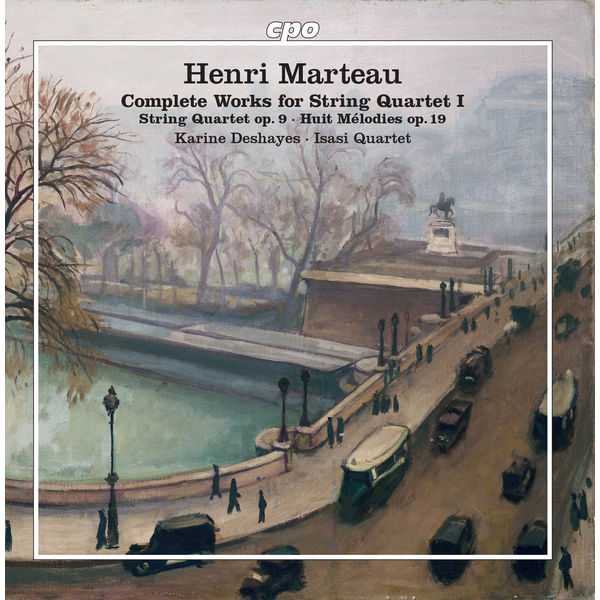
Composer: Henri Marteau
Performer: Karine Deshayes, Isasi Quartet
Format: FLAC (tracks)
Label: CPO
Catalogue: 555128-2
Release: 2018
Size: 319 MB
Recovery: +3%
Scan: yes
String Quartet No. 2, Op. 9
01. I. Moderato quasi andante
02. II. Scherzo: Allegro molto e giocoso
03. III. Andante sostenuto
04. IV. Finale: Allegro con fuoco
8 Mélodies, Op. 19c
05. No. 1. Pluie
06. No. 2. À Douarnenez en Bretagne
07. No. 3. Ritournelle
08. No. 4. Matin d’Octobre
09. No. 5. Chanson de Mer
10. No. 6. Vitrail
11. No. 7. Pitié des choses
12. No. 8. Dans la rue, le soir
It often happens that the compositional oeuvre of a renowned and perhaps even legendary performing artist disappears from view for quite a long time. In the case of Henri Marteau this disappearance was due in part to the fact that some of his compositions remained unpublished. Today the violinist Henri Marteau is known mostly only to specialists or fans of Max Reger’s music. After all, during the early years of the twentieth century Marteau was an important violin interpreter of Reger’s works. The close association between Marteau and Reger, who arranged Marteau’s Cello Concerto for piano in 1905, the year of the publication of the String Quartet No. 2, is sometimes quite evident here and in many other works by him. However, the contrapuntal intricacy of Marteau’s quartet also holds in store chromatic passages more reminiscent of Nielsen and his Quartet in E flat major op. 14 from 1897-98 than Reger’s modulations. In its own way the quartet very much anticipates developments far into the twentieth century while exploring German and French musical influence. The CD also includes Marteau’s Huit Melodies for soprano and string quartet – sung by Karine Deshayes, who in 2016 was named the ‘Lyric Artist of the Year’ for the second time at the prize ceremony of the Victoires de la Musique.
Poor Henri Marteau… Born in 1874 to a French father and a German mother, in a time when, after the war of 1870 and the loss of Alsace-Lorraine, the hatred between the two countries was still intense. He made an early start as a violinist early, and at the age of ten he stood in for his teacher at short notice, at a big concert in Reims, where he gave a perfect rendition of a Vieuxtemps concerto. Shortly after, he made his début in London and Vienna, conducted by Hans Richter, and crossed paths with Brahms, Tchaikovsky, Busoni, Dvořák, Nielsen, Grieg, Reger and many other great musicians of his day, with whom he would give many concerts. He received recognition in 1908 when he followed Joachim into the Berlin Conservatory. But 1914 came roaring in, and Marteau – an officer in the French reserves! – found himself sent to live in deepest Germany, forbidden from performing, and, worse still, taken by the French for a German spy. After the Great War, he took Swedish citizenship, continuing to perform in Germany in the Conservatories of Leipzig and Dresden, but his glory days as an instrumentalist were behind him and he passed away in 1934. His work itself suffered from the horrors of war, as the majority of his works only existed in manuscript form, and many were lost. But his quartets survived because they were often performed during his lifetime and therefore were widely published and circulated. The Second Quartet given here, probably written in 1905, highlights the musical link that joined Marteau to Reger: robust chromatism, constant counter-punctual charge, intensely rich polyphonies, even if the slightly excessive spirit in the French style proves that this could only be a work by Marteau. As for the Eight melodies for mezzo-soprano and string quartet, sung here by Karine Deshayes, accompanied by the Isasi Quartet, they date back to his internal exile in Germany, or his exile in Sweden, in the period 1915-17. For a long time they were thought to have been lost, but after a century they were finally published, in 2016! As a little raspberry blown by the composer, he chose to write his lyrics in… French. They also have a rather French melodic and harmonic charge, with a few accents that would have been very much at home in a piece by Debussy. Either way, these works are a pleasure to discover, especially given the quality of the performances on this record.